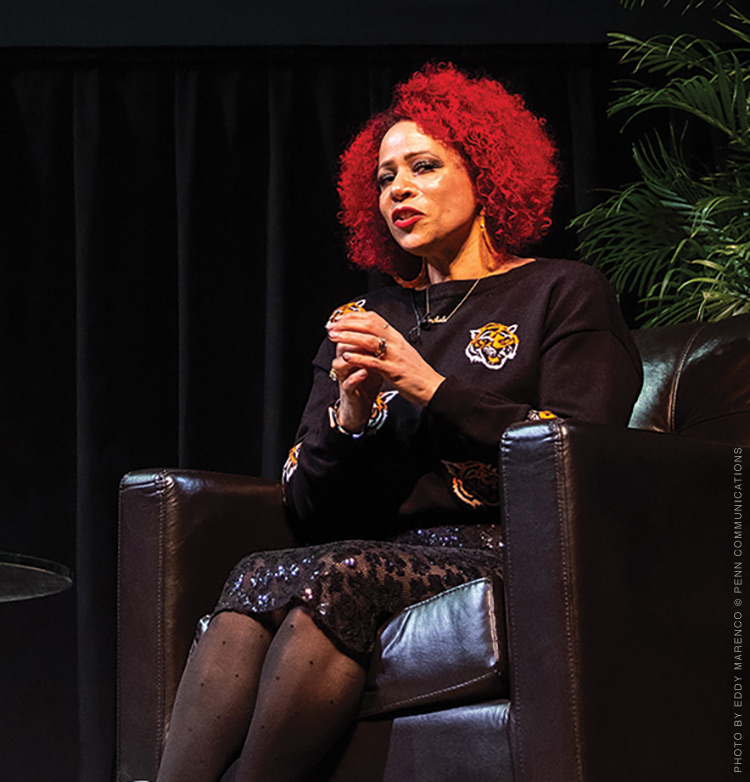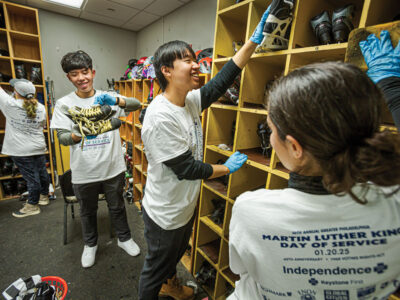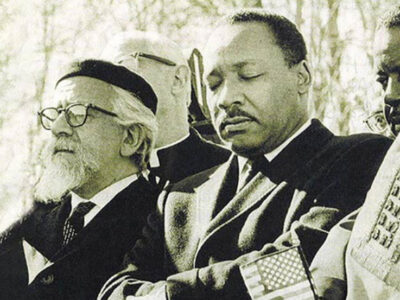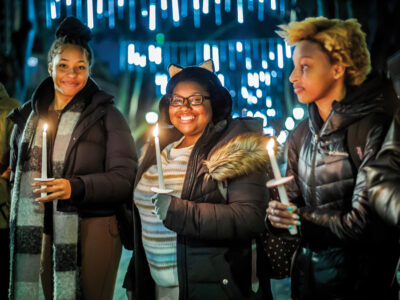Journalist and 1619 Project creator Nikole Hannah-Jones reveals her motivations during annual MLK Lecture.
Near the end of an hour-long conversation in which New York Times Magazine journalist Nikole Hannah-Jones discussed how much of her career has been fueled by anger and pettiness, an audience member inside Zellerbach Theatre asked an unexpectedly simple question.
“What brings you joy?”
Hannah-Jones took a beat before responding. “I hope you can tell from my demeanor that I’m actually a very happy person,” she said, smiling. “I have the amazing honor of getting paid to read and research and think and tell Black stories. Yes, I’m motivated by rage. But I feel so blessed every single day to do the work I do.”
Hannah-Jones was on campus in late January for the 22nd annual Reverend Dr. Martin Luther King, Jr. Lecture in Social Justice, hosted by Penn’s Center for Africana Studies in conjunction with the Annenberg School for Communication. Joined in conversation by Annenberg Presidential Associate Professor Sarah Jackson, the investigative journalist professed to be both joyful and “an anxious mess” ahead of the premiere of the 1619 Project docuseries on Hulu the next day. An offshoot of a New York Times Magazine essay series, podcast, and book of the same name, the 1619 Project “aims to reframe the country’s history by placing the consequences of slavery and the contributions of Black Americans at the very center of our national narrative,” per the New York Times’s initial description when it debuted in 2019 on the 400th anniversary of the beginning of American slavery.

“I feel joy every day,” continued Hannah-Jones, who’s received both praise and criticism for the controversial 1619 Project—and, in 2020, the Pulitzer Prize in Commentary for it. “I hope when the 1619 Project documentary comes out, the message people take away from that is all of Black life has never been [just] suffering: that even in the hardest of circumstances and the harshest of situations, we loved, we danced, we created, we cooked for each other, we held each other, we had babies, we loved our babies. We have always held on fiercely to joy, even in a society that was designed to try to take every last drop of it.”
The MLK Lecture, back in person after two virtual years, highlighted a 10-day commemorative symposium on social change, sponsored by the African American Resource Center and the MLK Executive Planning Committee. It also included wellness and service projects, dance and music events, a candlelight vigil, and more.
Touching on King’s legacy, Jackson pointed out that his advocacy of economic equality sometimes gets overlooked. “There’s this great quote he had a month before he was assassinated [in 1968],” noted the Penn professor and codirector of Annenberg’s Media, Inequality & Change Center. “He said, ‘What does it profit a man to be able to eat at an integrated lunch counter if he doesn’t earn enough money to buy a hamburger and a cup of coffee?’” Adding that it’s “important not to allow Dr. King’s legacy to be whitewashed,” Hannah-Jones said that the civil rights icon “appears to have been in support of issues of reparations and other economic redistributions” beyond what is typically taught in schools or what she called the “bad-faith quoting” of him that tends to occur around his birthday each year.
After helping to accomplish many goals of the civil rights movement, King “recognized that legal equality is only going to go so far,” Hannah-Jones said. “You have to deal with the material, economic disadvantages that most Black Americans, no matter where they live in the country, were dealing with. And he began to sharpen his critique. And that’s when he begins to lose the white liberal northern support.”
Hannah-Jones has argued herself that there’s never been sufficient economic restitution for Black Americans after the end of slavery—through the 100 years of “racial apartheid” following the Civil War to the peak of the Black Lives Matter movement in 2020, when she made the case for reparations in a New York Times Magazine essay entitled “What Is Owed.”
While not dismissing some of the “symbolic changes” that the summer of 2020 spawned (like the tearing down of Confederate flags and monuments and “a bunch of corporations doing diversity initiatives”), she argued that activists had asked for too little, especially because she correctly predicted that the ensuing backlash would be swift. “If you really think it’s time for a reckoning, we need to deal with the original issue of why Black Americans are suffering,” she said. “We’re suffering for a lot of reasons. But I’d rather suffer with money than without.”
Hannah-Jones said that she’s been angry about the treatment of Black people in this country for as long as she can remember, beginning when she was a kid reading the newspaper with her dad and deciding that she wanted to become a journalist. “People ask me all the time what motivates you, and I’m like, ‘Rage. Shit, I’m mad.’ That’s why I do what I do: I’m angry at the society that we have. But it’s how you channel the rage. You fuel it into research, you fuel it into what you’re reading and who you’re talking to and how you’re writing the story.”
It hasn’t always been easy. As she worked her way up the ranks from newspaper to newspaper, she said she almost left the profession when she was challenged about the amount of stories she wanted to write about Black people. Later she had a public spat with her alma mater, the University of North Carolina, where she had been offered a five-year contact to be the Knight Chair in race and investigative journalism. But UNC’s board of trustees initially resisted voting on the journalism department’s bid for her to receive a tenured professorship, leading to a protest on her behalf. When the trustees subsequently did vote on and approve her tenure, she declined the offer and instead went to Howard University, where she’s close to raising $25 million for a journalism center to increase diversity in the field. “That was a top five petty moment for me,” she said, calling it a “circumstance where people thought they had power over you, and it was important to show they did not.”
Yet behind all of her self-proclaimed pettiness and anger, Hannah-Jones remarked near the end of the lecture, lies a feeling of joy and an enduring spirit of optimism about the strength of Black people—and “how much amazing progress we’ve made only having our full rights and citizenship for half a century.”
“We’re here to commemorate Dr. King,” she concluded, “and he said that he doesn’t know if he’ll reach the promised land. ‘I might not get there with you.’ But I know whether or not we do, we owe it to our ancestors to fight. We don’t have any other choice. I never wake up and think how am I going to keep going. I don’t have a choice. We don’t have a choice. We might not ever see the world we’re trying to build, but damn it, we all better fight for it.” —DZ




